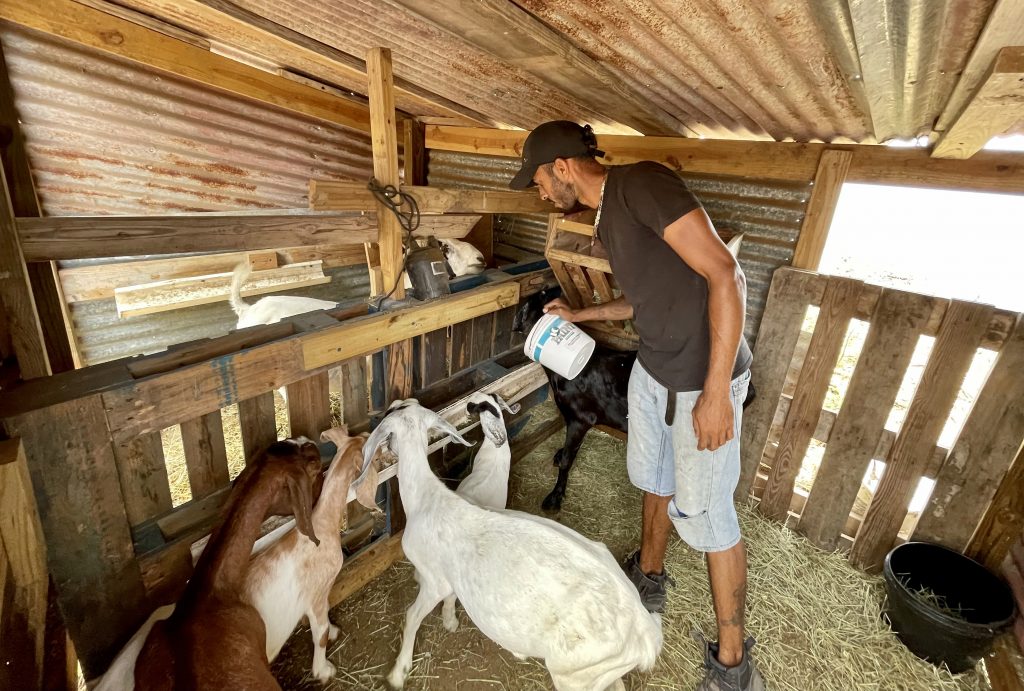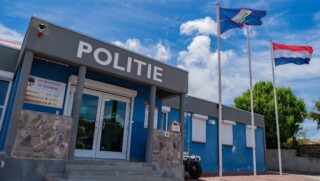Keeping Goats in Saba in a Sustainable Manner is a Challenge

The Bottom, Saba – Keeping goats in a responsible manner in a pen is no easy task on Saba. Roderick Hassell, Jerry Hassell, Orlando Hassell, Timothy Johnson, Justin Yu and Anna and Matthew Barnes know this from experience. They are mostly keeping goats because of their love for the animals.
“I was raised with them. I like goats,” said Orlando Hassell (28), who keeps goats since he was 20 years old. Jerry Hassell (47) started keeping goats two years ago. “It keeps me busy. I have them as a pet.” For Roderick Hassell (61), rearing goats is a long-time hobby. “I have been keeping goats all my life.”
Timothy Johnson (29) was raised around animals and shares a great love for his goats. “I like to see them in top condition.” Justin Yu (40) said keeping goats was in him from small. “I just love them.” Anna Barnes (35) got involved in keeping goats through her brother Reid Junior, who passed away two years ago in a tragic accident. “I started in 2018 because of Junior. I helped him, and I just loved it.” Anna’s younger brother Matthew Barnes (31) said he started with goats some years back and took care of them together with Junior. “I love animals. They are my comfort place, my safe place.”
Challenges
The seven interviewed goat owners all have one thing in common: there is no real money in keeping goats the way they do because the costs are rather high. In fact, these high costs are mostly their biggest challenge. The responsible goat owners pay a lot to import food, mostly hay and grains. And prices have only been going up in recent years.
The recurring droughts have been a challenge. “There is a lack of grass. And clearing areas for the grass to grow so you can feed your animals makes little sense because the wild goats eat it,” said Roderick who has 20 Boer and Nubian, mixed goats.
“I used to be able to get a lot of grass for my goats. Now there is a lot less to cut and a bale of hay costs me US $40. The investment you make in the goats is more than you get from them,” said Jerry, who keeps 15 mixed Boer goats, as well as pigs next to his house in Lower Hell’s Gate.
“It is a big investment. I bring the feed and hay in from Puerto Rico where it is cheaper. You make a little bit with the butchering. You don’t keep them for the money,” said Orlando who has 15 mixed Boer goats and also keeps bulls and sheep in Upper Hell’s Gate.
Vaccinate
Timothy has some 20 full-breed Boer goats in Upper Hell’s Gate. “I spend a lot on them. I always try to do better. I even vaccinate my animals against diseases. And I give them vitamins and minerals.” Timothy said that he mostly sells his Boer goats alive to other islands with which he makes some money.
“I invest more in them that I get out of them,” said Justin, who keeps about 45 Boer goats in Windwardside. “I sell them alive if I can. I butcher some and send the meat to St. Maarten where the market is much bigger than here on Saba.” Justin said he spends about US $100 per day on hay and feed.
Anna now only keeps five goats. Because of the drought, she couldn’t afford to keep more. “I had too many to feed and had to sell quite a few, because I was unable to maintain them.” Aside from the steep cost of feed and hay, having to buy materials to build a pen is a challenge. Keeping the pen in good condition involves lots of maintenance. “This is dedication. Keeping goats in a pen, there is no money in it.” But Anna loves her goats and that’s worth it all.
Dedication
Matthew has 15 Boer, Nubian and creole goats on the family property in St. John’s, close to Anna’s pen. “They cost a lot of money. You constantly have to buy bales of hay and feed for them. Also, water. The droughts are a big challenge. Keeping goats like this takes dedication and time. It is not about keeping them for the money. I do it because I love it. I was raised with animals. It is what we know,” he said. Matthew and Anna also keep a few pigs.
Matthew said he understood the need for the hunting of the wild goats, though he didn’t think all should be shot. “But fact is that there are too many of them now. Especially when it is dry, you see the goats fight to stay alive.”
Asked his opinion on the wild goats, Jerry said that it would be better if the owners caught them and keep them in a pen. “That way, they don’t cause destruction. Instead of quarreling about the issue, catch them, pen and feed them. Keep them for the goat meat.”
According to Orlando, keeping goats in a pen is safer for the animals, and the owner can better care for them. “That way, the goats are kept healthy, which is better for the animal and the owner.” Timothy said he didn’t like to see the wild goats go hungry and thirsty. “Some owners don’t put water. That hurts my heart because I love animals. Also, in the wild you can’t control the goats. If people need to get rid of them, they can hire me. I’m a good shooter,” he said with a big grin.
Overpopulated
“If you have goats, you need to take care of them. Feed them, provide water, vitamins and deworm them,” said Justin when asked about the roaming goats. “There are too many wild goats. They eat people’s yards. There is overpopulation of wild goats. But I don’t agree we need to kill all,” said Anna.
Keeping goats in a pen is better for the environment, better for Saba, said Roderick. And, goats in a pen don’t create erosion like wild goats do. “I hear rocks coming down the hill every day. Once these hills were full of trees,” he said, gesturing towards the hills close to his house in Kelbey’s Ridge. “We need trees for the rain to come down and to keep the moisture. But as long as we have so many wild goats roaming around, the trees will not grow. Look at my fenced yard, how green it is. The rest of area here can look the same,” he said.
Looking back at the past, Roderick said that in those times, people kept goats more in a controlled manner: the goats were moved in a group from one area to the next to give the land a chance to recuperate and farming could take place. Also, the owners shot more of their goats. “When they started to shoot less, the goats took over, turning large parts of the island into a dessert. And as you know, a dessert doesn’t attract rain.”
Also read
- Exciting Historical Kids Treasure Hunt unveils Oranjestad’s rich heritage

- Vacancy Fire Chief Sint Maarten

- Qredits Bonaire launches sustainability loan for small businesses on BES Islands

- Open day population screening Caribbean Netherlands

- AFRO Magazine ‘Statia Edition’ draws broad enthusiasm











